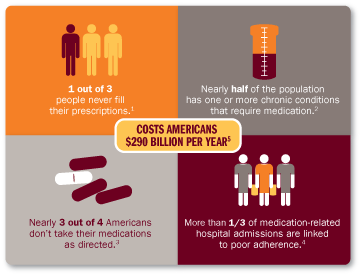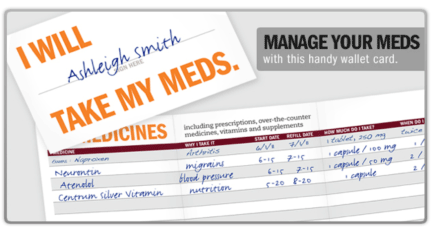The Rising Costs of Asthma and the Need for Medication Adherence
The burden of asthma on the health care system continues to grow in the 21st century. Asthma affects over 25 million Americans (8% of the population). Since 2001, the number of people diagnosed with asthma increased by 4.3 million, resulting in a 6% rise in overall healthcare costs. In 2007 alone, asthma was estimated to cost the US $56 billion in health care costs and lost productivity.
Children have experienced increasing rates of asthma especially those living in areas with unclean air. About 1 in 10 children have asthma, compared to 1 in 12 adults. The Centers for Disease Control reported that the largest rise in asthma, almost a 50% increase in new cases from 2001 to 2009, was among African American children.
Asthma, the chronic inflammation and constriction of the airways, can be treated and managed with appropriate medication. Almost half of all people with asthma in the United States have had an asthma attack; many of which could have been prevented with proper management. As, the incidence of asthma continues to grow, managing asthma is important to prevent further strain on the health care system.
Costs rise for asthmatics who do not take their medication as directed, leading to more missed days of school or work, hospitalizations and re-admissions and general decline in quality of life. A recent study found that 50% of children aren’t taking their medicine as prescribed, often because parents were afraid of medication side effects. Approximately 11% of insured patients can’t afford their asthma medicine. Increasing the patient share of out of pocket costs for children’s asthma medications, led to more children needing emergency treatment for complications related to asthma (Karaca-Mandi et al 2012, JAMA).
Following a medication plan, or medication adherence, is important for asthmatics; it improves health outcomes and decreases overall costs. There are numerous reasons why people don’t take their medication as directed. It can be hard to understand that a condition like asthma is a chronic disease that needs to be managed daily.
 POOR MEDICATION ADHERENCE LEADS TO POOR HEALTH OUTCOMES AND INCREASED HEALTH COSTS. From Script Your Future.org
POOR MEDICATION ADHERENCE LEADS TO POOR HEALTH OUTCOMES AND INCREASED HEALTH COSTS. From Script Your Future.org
Helping patients, parents, and caregivers understand asthma and talk with their health care providers about medication management can help to lower asthma health care costs and unnecessary emergencies. The National Heart, Lung and Blood Institute recommends developing an asthma action plan tailored to each individual to help control asthma, avoiding triggers for asthma, remaining physically active and consistently monitoring your asthma with your health care provider for changes.
The Script Your Future campaign, organized and developed by the National Consumers League, helps address the medication adherence problem for major chronic diseases, including asthma. Patients need access to education to help take control of their asthma, especially for reasons that make sense to them. This campaign provides tools to manage medicines and sample questions to help start a conversation between patients and their doctor, pharmacist or nurse about their medicine. It also has information to help patients understand their condition. Many things—from allergies to poor air quality, stress, and anxiety—can trigger asthma. This video explains more about what causes asthma and what patients can do to manage their health. An important step to becoming adherent is to make the commitment to take your medicine. Script Your Future has a pledge tool—patients can pledge to take their medicines or even pledge to help their child take their medicine too.
 TAKE THE PLEDGE. TAKE YOUR MEDS. Script Your Future.org
TAKE THE PLEDGE. TAKE YOUR MEDS. Script Your Future.org


The views and opinions expressed in this post are those of the author(s) and do not necessarily reflect those of MomsRising.org.
MomsRising.org strongly encourages our readers to post comments in response to blog posts. We value diversity of opinions and perspectives. Our goals for this space are to be educational, thought-provoking, and respectful. So we actively moderate comments and we reserve the right to edit or remove comments that undermine these goals. Thanks!